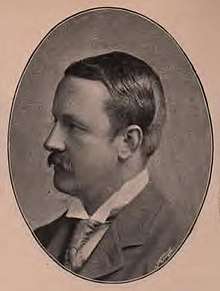Abel Henry Smith
Colonel Abel Henry Smith (6 December 1862 – 10 November 1930)[2] was a British Conservative Party politician and an English landowner of the Smith banking family.

.svg.png)
Smith was the son of Abel Smith (1829–98), from whom he inherited the large estate of Woodhall Park, near Watton-at-Stone in Hertfordshire.[3] Over a dozen of his ancestors had sat in the House of Commons over the preceding century.
At the 1892 general election, he was elected as Member of Parliament (MP) for Christchurch. He was re-elected in 1895, but at the 1900 general election he stood instead in the Hertford constituency which had been represented by his father until his death in 1898. He won the 1900 election, and held the seat until he stood down at the general election in January 1910.[4] He was appointed a deputy lieutenant of Hertfordshire in August 1910.[5]
After his death in 1930, aged 67, the contents of the family's stately home were dispersed, and the building rented out.[3]
References
- Debrett's Peerage, 1968, p.223, Smith/Carington, Baron Carrington; p.145, Smith, Baron Bicester, both descendants of the banker Abel Smith II (1717–1788)
- "House of Commons constituencies beginning with "C" (part 4)". Leigh Rayment's House of Commons pages. Archived from the original on 10 August 2009. Retrieved 24 April 2009.
- "History of the Woodhall estate". Woodhall estate website. Archived from the original on 1 August 2009. Retrieved 24 April 2009.
- Craig, F. W. S. (1989) [1974]. British parliamentary election results 1885–1918 (2nd ed.). Chichester: Parliamentary Research Services. pp. 295, 402. ISBN 0-900178-27-2.
- "No. 28410". The London Gazette. 26 August 1910. p. 6184.
External links
- Hansard 1803–2005: contributions in Parliament by Abel Henry Smith
| Parliament of the United Kingdom | ||
|---|---|---|
| Preceded by Charles Edward Baring Young |
Member of Parliament for Christchurch 1892–1900 |
Succeeded by Kenneth Robert Balfour |
| Preceded by Evelyn Cecil |
Member of Parliament for Hertford 1900 – January 1910 |
Succeeded by Sir John Rolleston |